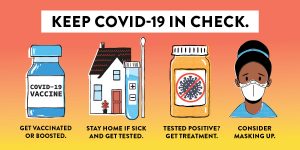DOVER, Del. (Dec. 11, 2023) – The Delaware Division of Public Health (DPH) takes the safety and well-being of all Delawareans seriously. With COVID-19, flu and RSV all prevalent this time of year, DPH is actively educating residents about how to mitigate exposure and transmission of these respiratory viruses.
Keeping in the spirit of the holiday season, DPH has taken a lighthearted approach and launched a fun, new, holiday-themed campaign reminding all Delawareans of four simple guidelines that can help them stay safe from respiratory viruses this winter:
- Get vaccinated for COVID-19, flu and RSV, if eligible.
- Stay home if you are sick.
- If you have symptoms or were exposed to someone with a respiratory illness, get tested and seek treatment if you test positive.
- If cases rise or you are immunocompromised, consider wearing a mask.
“On behalf of the Division of Public Health, I would like to wish everyone a safe, healthy, and enjoyable holiday season,” Steven Blessing, Director of the Delaware Division of Public Health said. “While these respiratory illnesses are no joke, we hope the images and messages in our new holiday campaign will spark some smiles while reminding us of all to do everything we can to keep ourselves and our loved ones protected.”
DPH also compiled a list of tips and resources to further ensure viruses take a backseat to gatherings and celebrations. Here are eight ways we can all spread joy instead of germs this holiday season:
- Get vaccinated. It’s worth repeating. Cases of COVID-19, flu and RSV are currently increasing. Vaccines are available to help lessen symptoms and prevent hospitalization.
- Wash your hands. This is so simple, but so effective. Washing hands for at least 20 seconds using soap and water prevents the spread of germs to protect the ones you love.
- Cover that cough. Use the inside of your elbow or a tissue to cover up that cough or sneeze. Try to avoid coughing into your hands, and if you do, wash them immediately using hand sanitizer or soap and water.
- Protect vulnerable loved ones. No one wants to get sick with a respiratory virus, but the impact of these illnesses can be particularly severe on the elderly and those with underlying conditions. Know who is at risk and take steps to mitigate any germs spreading.
- Traveling? Prepare early. Be sure you and your travel companions get vaccinated at least two weeks before your trip. This will allow the full effects of the vaccine to develop in your body for maximum protection.
- During that trip, mask up when appropriate. If you’ll be travelling by plane, train, or bus consider masking up during the ride. Those tight quarters, where ventilation might be poor and people around you may be coughing or sneezing, create ideal conditions for the transmission of viral illnesses.
- Did you get sick? Stay home. This is another tip worth repeating. No one wants to miss a holiday party or family dinner. For your own well-being and the safety of others though, stay home if you test positive for a respiratory illness, have a fever, or are presenting any of the common symptoms like coughing, sore throat, fever, or runny nose.
- Stay updated. DPH offers up to date information about COVID-19, flu and RSV. When in doubt, check the state’s website for answers to your questions.
Individuals with general questions about COVID-19 should call Delaware 2-1-1, individuals who are deaf or hard of hearing can text their ZIP code to 898-211, or email delaware211@uwde.org.
Hours of operation are Monday – Friday 8 a.m. to 9 p.m. and Saturday 9 a.m. to 5 p.m.
Medically related questions regarding testing, symptoms, and health-related guidance can be submitted by email at DPHCall@delaware.gov.
DPH will continue to update the public as more information becomes available. For the latest on Delaware’s response, go to de.gov/coronavirus.
